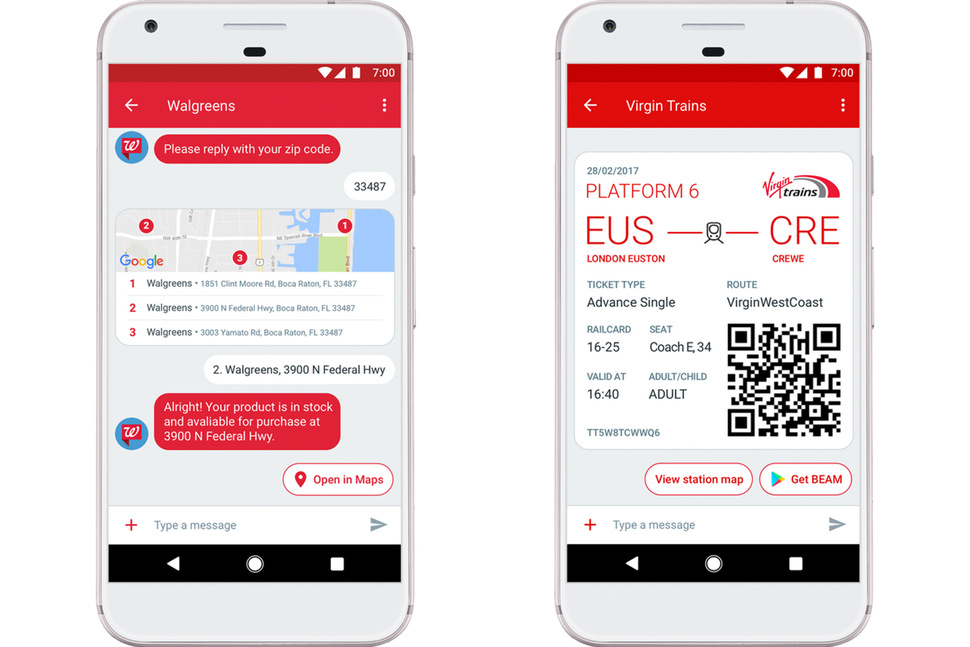On June 17 this year Google announced it is officially rolling out its RCS Chat in the UK and France. In the UK, the service officially became available on 28 June for some users. After this news broke, RCS became the main buzz word. However, RCS or Rich Communication Services is not a novelty. RCS protocol dates back to 2007. In 2008 GCM Association took it over, while in 2016 it became an agreed standard when GCMA published the Universal Profile on RCS. The Universal Profile is a set of features and technical enablers built to facilitate global operator deployment of RCS.
What is RCS?
RCS is a new messaging standard aimed to enable the industry to deliver a consistent and more advanced texting experience for billions of consumers worldwide. The goal is to have most smartphones with a built-in advanced messaging that features read receipts, the capability to send high-resolution images and videos, typing indicators, animated stickers, better group texting, etc. Similar to popular chat apps like WhatsApp, Facebook Messenger, Signal, and others. In other words, RCS is the protocol intended to supersede the SMS. This protocol should provide improved messaging. To put it simply, RCS is enriched SMS.

Virgin Trains is the first company to use RCS-based messaging. Credit: Virgin Trains
As GCMA says, the Universal Profile enables the telecom industry to gain traction and keep its potency as the most important digital communication provider. In recent years the industry was disrupted with the rise of OTT messaging apps. P2P SMS traffic volumes have suffered a downturn causing the industry to search for new revenue streams. The solution was found in the A2P business messaging. By implementing the Universal Profile, carriers, mobile operators, and OEMs will be able to offer advanced messaging technology seamlessly and quickly. GCMA even forecasts that A2P RCS business will be worth an estimated $74 billion by 2021.
Who supports RCS?
Both Microsoft and Google are keen supporters of this next-generation messaging protocol. Google’s main objective is to ensure it becomes a default texting app across the Android ecosystem. It is not the first time Google is challenging the OTTs by offering its own communication solution. However, none of them succeeded until now.
After teaming up with major carriers to adopt the RCS, in 2018, Google launched its new messaging brand Chat built on the RCS Universal Protocol. Google’s Chat officially ‘killed’ its predecessor Allo in May 2019. After a year of waiting for carriers to launch the RCS and to make it globally available, Google finally decided to take the matter into its own hands as there was no real progress on the horizon. Hence, in June, they announced that customers in the UK and France would be able to opt for Google’s Chat directly without waiting for the carriers to provide the service. The service is available only to Android users.
Google still hasn’t revealed which countries will be next in line to obtain an improved messaging experience. We assume Google is waiting to see the number of opt-ins from the UK and France to be able to decide on further actions. What we know is that Google intends to release the service to more countries throughout the year.
How will Google’s Chat work?
Users with Android phones will be able to opt-in to Chat. When they open the default Android Messaging app, they will be prompted to switch to RCS Chat. Still, Google does not intend to offer Chat as a default app yet. They want to ask people to decide if they wish to use it or not. Unlike iMessage and Apple, who automatically opts users into their messaging app, Google is offering a more flexible approach. It allows people to choose. It may be that for now, Google is forced to do it in this way, since the RCS is still not available globally. Anyhow, we think it is realistic to expect ‘Apple’s method’ from Google in the future. At the moment, the crucial thing the users need to know is that Google is providing the RCS service directly through the Chat.
If you opt into Chat and you see ‘Chat’ sign in the app, it means the other phone also supports RCS. If this is not the case, the fallback is SMS. RCS will work on any mobile phone regardless of whether the carrier or Google provides the service. Google’s decision will have no impact on those who already have this service enabled by the carriers. They will continue to use it with no need for an additional upgrade or opt-in. Unfortunately, it is still unknown when the RCS will finally become available to users worldwide. At the moment, Google’s effort is aimed at speeding things up to the maximum, since the carriers and phone manufacturers haven’t pushed the initiative strong enough.
RCS in numbers
Currently, 76 mobile operators have pledged support for RCS messaging. The GSMA expects another 59 operators to adopt the service by Q1 2020, totaling to 135 MNOs next year. The most prominent mobile phone vendors offering their own RCS messaging client with their devices are Samsung, LG, and Huawei. Only two OS providers are currently supporting advanced texting: Google and Microsoft.
What is most noticeable is the absence of Apple. As it already offers its rich messaging solution, Apple seems not interested to embrace enhanced texting protocol any time soon. If such an opinion prevails, many Android users will continue to use popular chat apps when they want to send rich media to people having iOS. How much this will affect the RCS success is yet to be seen. Right now Android runs on more than 75 percent of smartphones, while iOS is around 22 percent. Although Android is much more dominant, this 22 % could be a serious impediment.
RCS: flaws & obstacles
RCS currently has one major weakness: it is not end-to-end encrypted. From the security point of view, this is a huge issue. However, Google claims they are not keeping messages that went through their servers. The moment the message has been delivered to the end-user, it is deleted from the RCS backend service. The only reason why the messages could be kept for some time is to be delivered when the end-user goes online. Still, lack of encryption means service providers could read messages, and in case of some governmental inquiry, they could be provided for inspection.
The second hurdle to overcome is the fact the protocol needs to be accepted by all operators. We have mentioned earlier that 76 operators have already rolled out the service. Having in mind there are some 800 mobile phone operators worldwide, it is easy to conclude this is a rather small percentage.
The third significant barrier, maybe the biggest one right now, is that no one knows for sure who is going to pay for the service. Sounds crazy, but it is true. End users will not want to have any additional costs, regardless of how good the messaging might be. The reason is obvious: why to pay something you can use for free through chat apps like WhatsApp or Messenger? On the other hand, business SMS messaging is already the most popular and fruitful direct marketing channel. Companies wanting to upgrade to RCS will need clear pricing to be able to decide whether this channel will be more profitable than A2P SMS messaging.
Are we on the brink of the new RCS business messaging era?
Although RCS is defined as SMS messaging 2.0, we don’t expect to see it replacing A2P SMS any time soon. The main reason is that all carriers must adopt it, which has already been a significant obstacle that forced Google to step forward with the latest initiative. However, even when a carrier offers the service, it doesn’t mean every Android phone on the network will get it. Operators are approving handsets individually, which takes much time and delays the implementation further.
Moreover, if Apple doesn’t accept RCS, brands, and businesses will be forced to divide their mobile marketing tactics based on the OS. For SMEs, this will be a costly problem. It is most likely that most companies will continue to use SMS since it reaches every handset in the world, regardless of the operator or OS. In this way, they will save time and money.
The lack of a clear billing strategy is also driving people away from RCS. In the same time, the idea that Google is offering yet another messaging solution after a series of failures is not promising too. Hence, we are sure that SMS business messaging will thrive for many more years.





